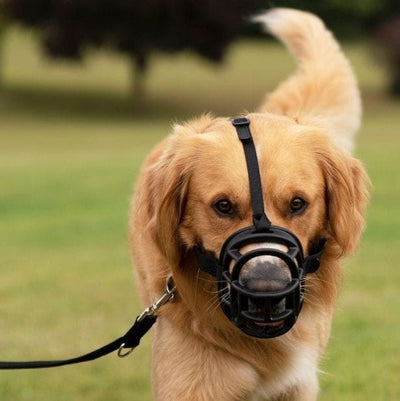 Dogs are man's best friend, but sometimes their excessive barking can be a nuisance. Whether it's barking at the mailman, the neighbour's cat, or just out of boredom, incessant barking can be frustrating for both you and your furry companion.
Dogs are man's best friend, but sometimes their excessive barking can be a nuisance. Whether it's barking at the mailman, the neighbour's cat, or just out of boredom, incessant barking can be frustrating for both you and your furry companion.
Fortunately, there are expert dog trainers who can help you teach your dog to stop barking. These trainers have spent years working with dogs of all breeds and temperaments, and they know the most effective techniques to curb barking behavior. In this article, we'll share some of their top tips for training your dog to stop barking.
From positive reinforcement to distraction techniques, these methods will help you and your dog enjoy a quieter and more peaceful home life. So, grab a treat and get ready to learn how to train your dog to stop barking!
Understanding why dogs bark
Before you can train your dog to stop barking, it's essential to understand why they bark in the first place. Dogs bark for different reasons, including:
Alert: Dogs bark to alert their owners of potential danger, such as an intruder or a fire.
Territorial: Dogs bark to protect their territory, such as their home or yard, from perceived threats.
Attention-seeking: Dogs may bark to get attention or to ask for something they want, such as food or playtime.
Anxiety or fear: Dogs may bark when they are nervous or scared, such as during a thunderstorm or when meeting new people.
Boredom or frustration: Dogs that are bored or restless may bark to release pent-up energy or express their frustration.
Understanding why your dog barks will help you develop an effective training plan that addresses the root cause of their barking behaviour.
The negative effects of excessive barking
Excessive barking can be frustrating for both you and your dog. It can also be a nuisance to your neighbours and can result in noise complaints or even legal action in some cases. Furthermore, excessive barking can cause stress and anxiety for your dog, which can lead to other behavioural problems. Dogs that bark excessively may also be at risk of injury, as they may engage in destructive behaviour or attempt to escape their yard or home.
Techniques for training your dog to stop barking
 Now that you understand why dogs bark and the negative effects of excessive barking, it's time to learn some effective strategies for training your dog to stop barking. Here are some tips from expert dog trainers:
Now that you understand why dogs bark and the negative effects of excessive barking, it's time to learn some effective strategies for training your dog to stop barking. Here are some tips from expert dog trainers:
Positive reinforcement training methods
Positive reinforcement is one of the most effective training methods for dogs. This technique involves rewarding your dog for good behavior, such as when they stop barking on command. When your dog barks excessively, use a command like "quiet" or "enough" in a firm but calm voice. When your dog stops barking, immediately reward them with praise, a treat, or a toy. Over time, your dog will learn that quiet behaviour is rewarded, and they will be more likely to comply with your commands.
Consistency and patience in dog training
Consistency and patience are key when it comes to dog training. It's essential to be consistent in your commands and training techniques to avoid confusing your dog. For example, if you use the command "quiet" to stop barking, use the same command every time your dog barks excessively. Similarly, be patient with your dog and give them time to learn and adjust to new behaviours. Dog training is a process that requires time and effort, so stay committed and consistent in your training efforts.
Common mistakes to avoid when training your dog
There are some common mistakes that dog owners make when training their dogs to stop barking. One of the most common mistakes is yelling at your dog when they bark excessively. Yelling can actually make the barking behaviour worse, as your dog may interpret it as attention or a reward. It's also important to avoid punishing your dog for barking, as this can lead to fear and anxiety. Instead, focus on positive reinforcement and redirecting your dog's attention to a new activity or behaviour.
Tools and equipment to aid in training
There are several tools and equipment that can aid in training your dog to stop barking. For example, anti-barking collars emit a sound or vibration when your dog barks excessively, which can help to interrupt the behavior. However, it's important to use these tools responsibly and under the guidance of a professional dog trainer. Other tools, such as puzzle toys or interactive games, can also help to keep your dog engaged and distracted from barking behaviour.
Learn more here about What are the best puzzle toys for dogs?
Investing in an anti-bark collar
Petsafe offers a range of collars designed for different breeds and sizes of dogs. It's crucial to choose a collar that fits your dog properly and is suitable for their specific needs. Shop the range of no-bark spray collars here.
It's crucial to choose a collar that fits your dog properly and is suitable for their specific needs. Shop the range of no-bark spray collars here.
Petsafe barking collar refills are available for sale here.
Tips for dealing with barking in specific situations (e.g. when guests arrive)
Barking behaviour can be triggered by specific situations, such as when guests arrive at your home. In these situations, it's important to prepare your dog and set clear expectations for their behavior. Consider using a crate or a designated quiet area for your dog when guests arrive, and reward them for calm behaviour. You can also use distraction techniques, such as providing a puzzle toy or a chew toy to keep your dog occupied. Additionally, it's important to communicate with your guests and let them know how to interact with your dog to avoid triggering barking behaviour.
Success stories from expert dog trainers
Expert dog trainers have seen many success stories when it comes to training dogs to stop barking. For example, one trainer used positive reinforcement techniques to train a dog that was barking excessively due to separation anxiety. By gradually increasing the amount of time the dog was left alone and rewarding calm behaviour, the dog was able to overcome their anxiety and stop barking excessively. Another trainer used distraction techniques, such as providing a chew toy, to redirect a dog's attention from barking behaviour. With consistency and patience, the dog was able to learn new behaviours and stop barking excessively.
Training your dog to stop barking can be challenging, but with the right techniques and strategies, it's possible to achieve success. By understanding why your dog barks, using positive reinforcement training methods, and avoiding common mistakes, you can help your dog learn new behaviors and enjoy a quieter and more peaceful home life. Remember, patience and consistency are key, and always consult with a professional dog trainer if you need additional guidance or support. With time and effort, you and your furry companion can enjoy a happy, healthy, and peaceful relationship.
© weknowpets 2023





